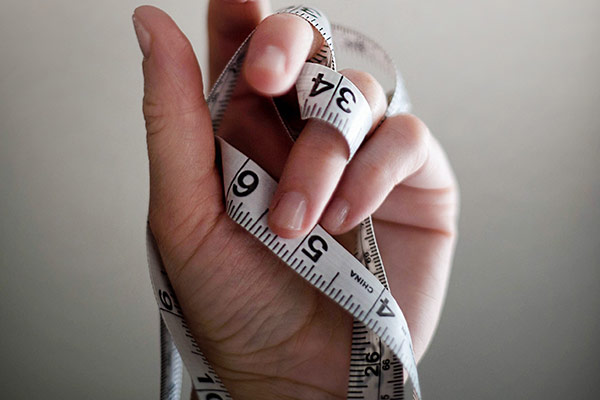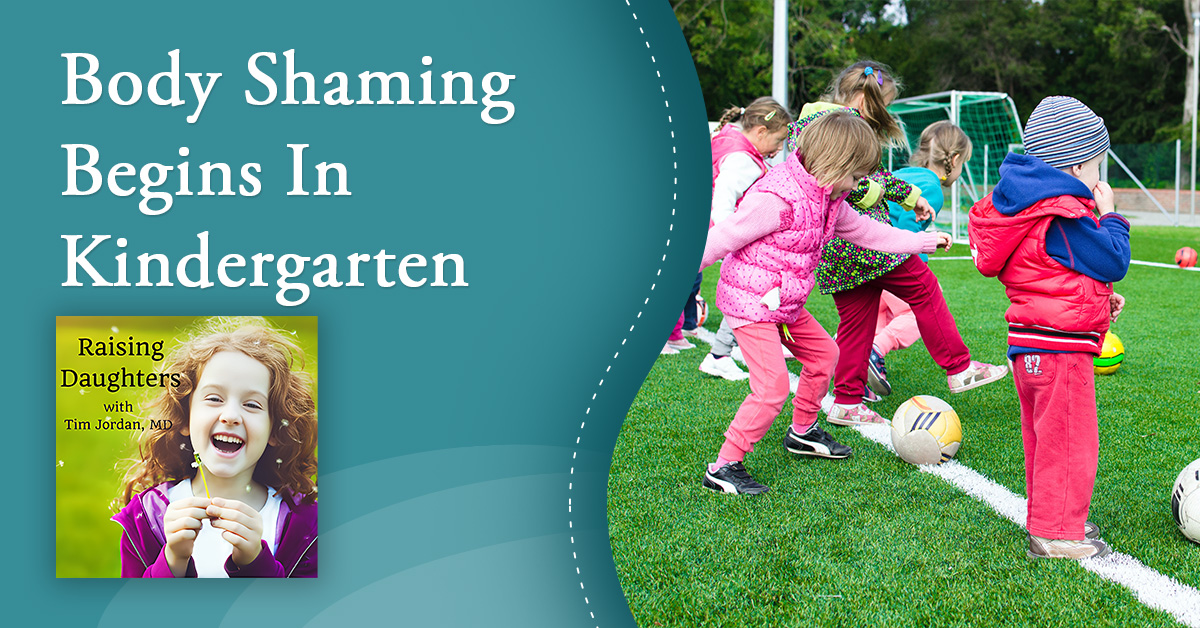When do you think girls start experiencing body shaming? Today, Dr. Tim Jordan shares three stories of girls he’s seen in his counseling practice. Body shaming is getting to be a big issue, especially with young girls. Tune in to help your daughters feel empowered and not be at the mercy of the media, social media, their friends, or comments around them.
For more information on this topic, check out Dr. Jordan’s book, Sleeping Beauties, Awakened Women: Guiding the Transformation of Adolescent Girls.
—
Listen to the podcast here
Body Shaming Begins In Kindergarten
In this episode, let me start with a quick joke question. What did the girl DNA say to the other girl DNA? The answer is, “Do these genes make my butt look fat?” I want to talk about an important issue because I’ve been seeing more and more girls in my counseling practice with this issue. The issue is body shaming. Girls are talking badly about themselves and how they look. One of the questions I want to start with is, when do you think girls start experiencing body shaming? Let me tell you three stories of girls whom I’ve seen in my counseling practice.
The first one is Hannah. That’s not her name but I’ll just use the name. Hannah asked her mom one day to look at a picture of her and her sister. She said, “Mom, what do you see?” The mom said, “I see two strong, beautiful, and creative girls. What do you see?” Hannah replied, “I see a beautiful girl named Amy, my sister, but I see ugly for me.” The mom was shocked. Around this time, this little girl started to refuse to go to school. She wouldn’t share why.
When I saw her in my counseling practice, she told me that one day, a girl told her that out of the whole class, she was the ugliest. This hurt her feelings terribly. She felt ugly ever since that time. She told me, “I feel like a flower. If I have a bad day where there’s a lot of mean girl drama, it’s like a petal falls off. If it’s a good day and I’m happy, the flower grows and I get my petals back.” That’s Hannah.
The second girl’s name is Jane. Jane told me in my counseling practice that she always wears shorts and T-shirts over her swimming suit. She said she did all summer. I asked her why. She said, “People have been calling me fat for a long time at school. It’s my way of covering up.” The third girl is Sophie. Sophie told me that she hates gym class. She’s always making excuses to not go. She acts sick. She goes to the nurse’s office. She forgets her gym clothes. I asked her why. She told me, “I hate the way my body looks.” When I asked her, “What don’t you like?” She said, “My thighs are so fat.” This is a girl who’s very muscular and very athletic and plays lots of different sports.
When do you think these girls started being dissatisfied with their bodies? A lot of adults assume it’s middle school. For Hannah, it was kindergarten. For Jane, it was first grade. For Sophie, it was second grade. I’m seeing more girls in those younger grade school ages who are already being negative about their bodies. Why? For a lot of them, the reason is they’ve experienced body shaming and fat shaming.
According to the Oxford English Dictionary, body shaming is the act or the practice of humiliating somebody based on their body type by making critical or mocking comments about their body shape and size. What girls would say is it’s girls talking bad about themselves or other people, about their appearance, looks, and bodies. There’s been all kinds of data that as many as 94% of teen girls have been body shamed by somebody and about 65% of teen boys report the same. It’s a lot more for girls.

There are a lot of reasons for that. We blame social media a lot and that is one of the reasons. The culture has become hyper-focused on looks and appearance. Social media has made it easier for girls to look at images. It’s increased their focus on images and the way people look. In the old days, there were magazines that you could look at and comment about, maybe movie stars. Now, there are images of everybody nonstop 24/7 on Snapchat, Instagram, Facebook, and any other place they want to look. There are constant images that are bombarding them.
I saw a study in Psychology Today that said that they estimated that young people are bombarded by at least 5,000 advertising messages every day. That’s not the only kind of image they’re looking at. I saw another study that said when girls look at magazines for 16 minutes, it lowers their self-esteem in over 80% of girls. I saw a study done in Britain that said that half the young women in the UK study said that seeing ads using thin models made them feel more conscious of the way they look and made them want to start to diet or lose weight. The messages that women get about their bodies, it has been found in research, tend to affect them a lot longer than it does for guys.
I saw a survey from Yahoo Health on body image and acceptance. What they found in their survey of thousands of teenagers was that 70% of males were either body positive, which meant they loved the way their bodies look or their body neutral, which meant they’re okay with the way their bodies look. They’ve made peace with their imperfections.
For most men, it’s that way for most of their lives. What they found for girls was different. Sixty-six percent of teen girls are either body negative, meaning they’re dissatisfied with their bodies or their body ambivalent which means they have a love-hate relationship with their body. That negativity stays pretty consistent as they age. If you’re wondering who’s doing this body shaming and fat shaming for girls, we can point their finger at social media, movie stars, and the culture. They all have some blame.
I’m going to mention two places where body shaming happens the most. 1) They’re friends. Girls tell me all the time when they’re in gym class or the locker room looking in the mirrors, like doing their hair and stuff, that girls are constantly body shaming themselves. They’re talking about how fat they look. They don’t like their hair or nose. The hallway at school is a place where lots of comments go flying back and forth. In the cafeteria at lunchtime, there are all kinds of negative comments about themselves.
Girls are constantly body-shaming themselves. They talk about how fat they look. They don't like their hair. They don't like their nose. Click To TweetGirls will talk about food and food intake. Girls will see their friends not eating lunch. They’ll ask why and they’ll say, “It’s because I’m too fat.” Girls will make comments like, “Are you going to eat all of that? Are you eating pasta? Do you want to eat that?” Girls also hear their “skinny friends” criticizing themselves as being fat. They look at themselves and they’re heavier so they conclude, “I’m fat. I’m a blimp compared to her so I need to start dieting and losing weight.” Friends are a huge place where body shaming happens.
The other one, perhaps, surprisingly, is moms. I saw a study that said that 62% of women compared to only 30% of men reported being body shamed by their moms. Some of these moms are criticizing their daughters. It’s even worse when their dads do it. I don’t think dads do it as much but the girls who I’ve talked to, their dads have made comments. I had a girl who came in whose dad squeezed her arm fat and said, “You need to start losing weight.” It’s harder when they hear it from their dads but moms do it more.
It’s interesting. I did a mother-daughter retreat a couple of years ago in Europe. We had 25 mother-daughter pairs from all over Europe. We were talking about body image one day. We talked to the moms and asked them, “How many of you talk bad about yourself in front of your daughters?” These moms are like, “I don’t do that. I know better than that.” Almost all of them said, “No way.”
We asked their daughters who were sitting there listening, “How many of you have heard your moms talk bad about yourself?” All of the girls raised their hands. The moms were shocked because they weren’t conscious of those little comments that they were making about themselves when they were getting dressed or looking in the mirror.
On the positive flip side, I read a study where they found that having a mom who is not self-critical of her weight or their body made girls 40% more likely to be body-positive or body-neutral. Having moms who were okay with their bodies and who talked nicely about their bodies did have a very positive effect on their daughters. The same they found was true oftentimes with people who are important to their girls like teachers or maybe a school counselor. Anybody that kids might see as an authority figure or a mentor, somebody who was important to them, their effect on the girl was also positive if they were positive about how they looked.

We’ve got to start teaching girls to stop comparing themselves so much and be aware of the cost to them of comparing themselves to other people. If they’re doing that to figure out if they’re okay, they’re screwed. In their minds, they’ll always be able to find people who they think are thinner, prettier, sexier, or hotter. It’s a huge trap to compare yourself to try and figure out, “Am I okay? Do I look okay?” We need to teach our daughters to start catching themselves when they’re self-critical and fat-shaming themselves, and learn how to switch that, to remind them of the cost when they negatively ruminate about their appearance or their body and also when they’re stuck in their heads about how they don’t like how they look.
I’ve made lists with girls before at our summer camps and our weekend retreats of all the things that girls judge about their bodies. I’ve seen lists of every body part imaginable. Not just their stomachs or thighs but things like ear lobes, fingernails, and toes. It’s so self-critical. I want our girls to be able to come to us if they’ve had an experience where they were body shamed or fat-shamed or someone teased them about their looks and be able to talk about it for us to help them decide something different than what they’re deciding.
Most girls go in their heads and start to make decisions like, “I guess I’m fat. I’m too fat. I’m not very pretty. I’m awkward. I don’t like the way I look.” When they hear that fat shaming and body shaming going on around them, they internalize it as, “There’s something wrong with me. I don’t like the way I look.” We need to help them redecide that and reframe what they’re hearing to not make it be about them and not internalize it like, “I don’t like the way I look.” I help girls a lot in my counseling practice focusing less on appearance and more on how their body works.
The girl I talked about at the beginning, Sophie, has muscular thighs. I asked her how her body worked for her and she gave me a weird look. I said, “How does your body function? What do you do with your body?” One of the things that she does is she goes to Taekwondo three times a week. She’s good. She’s below a black belt. I said, “Does your body work for you at Taekwondo?” She said, “Yeah.” I said, “How does it work?” She said, “My body’s flexible. I’m strong. I have good endurance.” I ask girls who play soccer or other sports, “Does your body work for you?” They talk about things like quickness, endurance, strength, and flexibility.
If we can teach our girls to think more in terms of our body as, “How is it working for me,” and less on, “How does it look,” that’ll help a lot. Girls who play sports and research have shown this to be true. They worry less about how their body looks and their appearance because they’re much more focused on the athletic part of it. That’s very protective.
Body Shaming Begins In Kindergarten Click To TweetFinally, I oftentimes have girls make agreements with their best friend group. If they are sitting around at a sleepover and maybe some fat-talking, fat-shaming, or body shaming is going on, it’s good to have somebody in the group to step up and say, “I don’t like when we do this. It’s discouraging. It makes me feel bad about myself. I can’t stop thinking about it.” I’ve had a lot of girls have their close group of friends make an agreement that says, “We’re not going to do this. If somebody starts, we’re going to catch it and redirect it.” If they make that kind of agreement with each other, it helps a lot because that’s a place where they get most of it.
Finally, if you’re a mom reading this, take seriously the part about our daughters constantly watching us and they’re listening. If they hear a lot of body shaming, fat shaming, and negative comments about how you’re looking, they internalize that as well. A lot of daughters look up to their moms. They think their moms are pretty. If their pretty mom is talking negatively about herself, a lot of girls, like they do with their friends, look at themselves and say, “I wish I looked a little more like my mom but my mom doesn’t like it so therefore, I’m bad, ugly, and heavy.” Catch yourselves and become very conscious of what you’re saying around your daughters.
I would start having conversations about this earlier than seventh grade. I would start talking about things about looks and how their bodies function when they’re younger, when they’re in early grade school. I’d open up the conversation about how girls talk about themselves at school, in the hallway at school, or in a gym class. You may hear your daughter make a comment about her thighs being heavy. I would listen a lot and ask questions about it. “That’s interesting you say that. I’m curious. Why do you say that?” I would try and get to what’s going on.

A lot of times, it may go back to a comment that they heard from somebody at school, a friend, somebody who’s not a friend, or somebody in the hallways. You can help them redirect their thinking and help them make better sense of people’s comments. I don’t want our daughters to be at the mercy of the media, social media, their friends, or comments around them. I want them to be empowered to start looking inward and deciding if they’re okay based on what they think about themselves. That’s easier said than done, and it’s never too late to start.
I’ll be back with another episode. I do appreciate you stopping by and reading. Please refer these to your friends, too. A lot of times these shows are also interesting and fun to tune in to with your daughters. This might be a good one for that. That might open up a conversation about how they feel, how they look, and what they’re hearing at school in the hallways and locker room. There you have some rich conversations. Get into the heads and the experience of, “What are my daughters experiencing?” Thanks for dropping by. Check out all the things that I do with my books and things at www.DrTimJordan.com.
